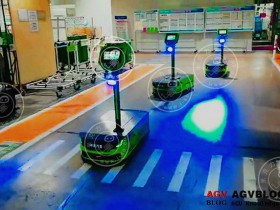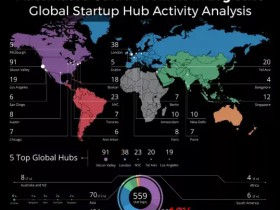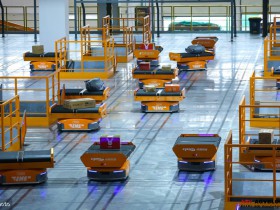[Rogo Guide] Traditionally, AGV and automatic mobile robot (AMR) are two methods of using a machine for material handling in a warehouse. However, with the advancement of automation technology, their definitions have become ambiguous in recent years.
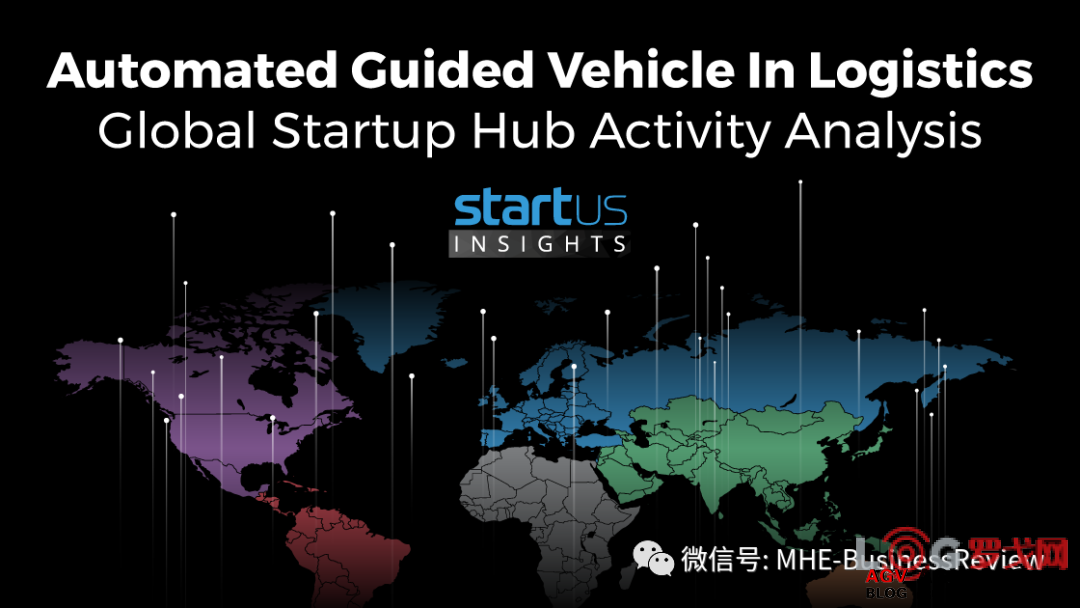 Logistics AGV: An analysis of the five major gathering places for start-up companies in the global industry
Logistics AGV: An analysis of the five major gathering places for start-up companies in the global industry
Startus Insights News: We conducted a detailed analysis of the global geographic distribution of 559 automated guided vehicle ( AGV ) startups to determine the top 5 global aggregation hubs. Explore the global AGV landscape and meet some of the most promising startups in this field!
Over the past few decades, global trade has increased by several orders of magnitude, which has led to increasingly large and complex supply chains . Globalization has brought international trade to an unprecedented level, requiring the logistics industry to innovate frequently to manage large quantities of goods circulating around the world. This has made the traditionally important logistics hubs bigger and bigger, and it has also made some newer hubs an important global hub. Logistics innovations that use automated guided vehicles or AGV fleets save the time and cost of automatic cargo transportation and improve worker safety.
Traditionally, AGVs and automatic mobile robots (AMR) are two methods of using machines for material handling in warehouses . However, with the advancement of automation technology, their definitions have become ambiguous in recent years. AGV challenges include precise localization, better fleet management and safety issues, to name a few.
The world's 5 largest AGV startup centers
Using our StartUs Insights platform, we analyzed the geographical distribution of global activities of automated guided vehicles in logistics. We have identified 20 regional centers *, which are active in developing automated guided vehicle solutions to serve warehouses, e-commerce fulfillment centers, and cross-border transportation.
According to our data, Silicon Valley, London, New York, Tel Aviv and San Francisco are home to 191 startups and emerging companies, accounting for 34.17% of global startup activity. Let's take a look at some of the five top-level hubs for autonomous vehicle startups.
According to our data, more than 85% of the activities of automated guided vehicles for logistics occur in North America and Europe. The latest developments in artificial intelligence (AI) technology, such as the combination of machine vision and logistics hubs on major trade routes, have created favorable conditions for automated guided vehicles to change material handling and other aspects of the logistics industry.
Even if there are relatively few activities in other parts of the world, the large population in Asia has brought huge challenges and opportunities to the logistics industry. As the market shifts to new regions, logistics innovation also needs to meet market demands quickly and cheaply.
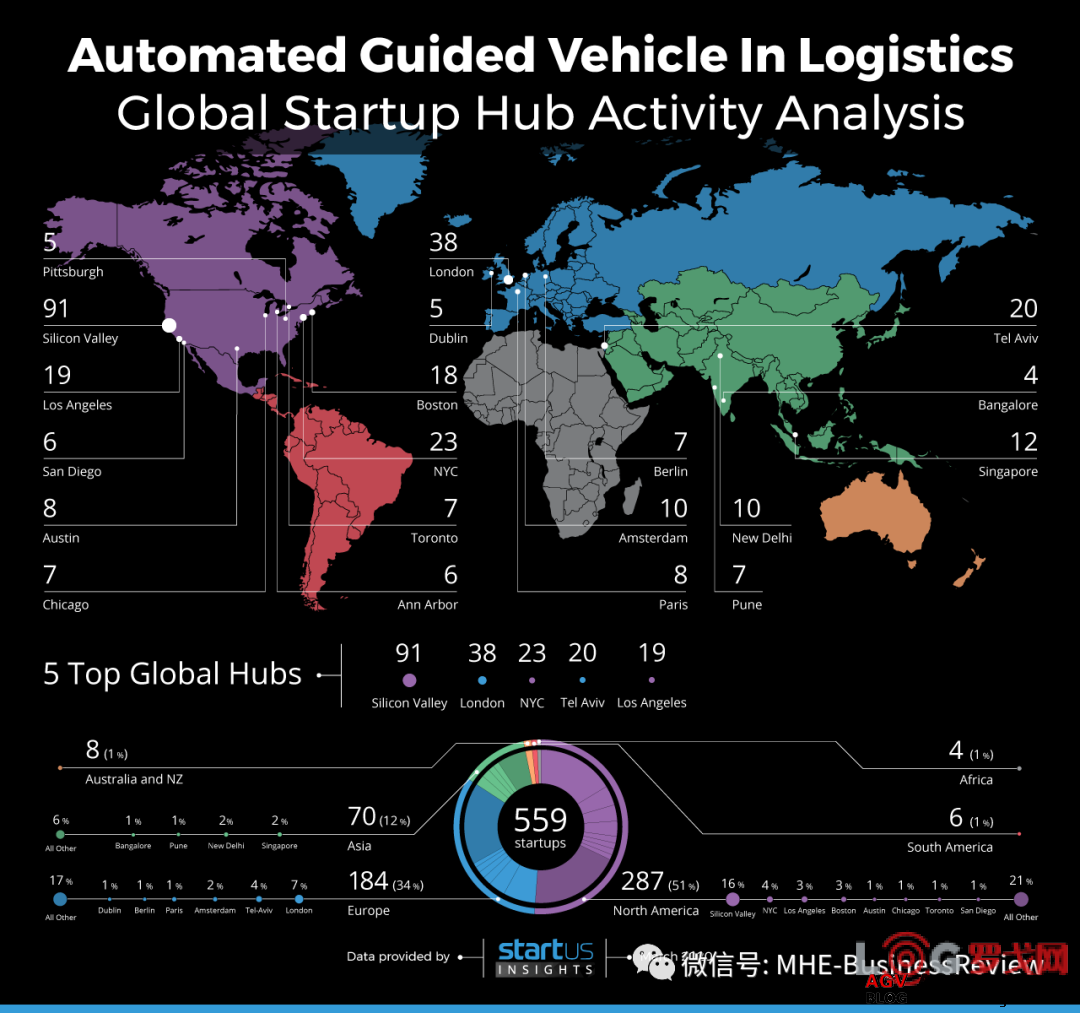
# 1 Silicon Valley | 91 Startups and Emerging Companies
Silicon Valley has thousands of companies that transfer online businesses to the Internet, and Silicon Valley will benefit from a symbiotic relationship with the logistics industry. Large e-commerce companies are investing in automated guided vehicles to expand the size of their warehouses. In addition, they are introducing newer technologies such as machine vision to make transformative changes, including making AGV more autonomous.
Siera.AI is a Palo Alto-based startup that uses AI to safely, autonomously process, inspect, and transport materials in warehouses. Their vehicle autonomy solution enables any self-guided vehicle to have smart truck technology, enabling it to prevent collisions and automate unmanned driving. The solution also replaced the paper list with a digital list. This can speed up compliance, eliminate accidents and predict labor shortages.
# 2 London | 38 startups and emerging companies
The population density of London is high, and the number of people who work during the day is also very high. Narrow roads and heavy traffic further exacerbate the city ’s logistics difficulties. In addition, a small part of the land can be used for warehouses, and the rent is one of the highest in the world. Therefore, a major trend in London logistics is the growth of parcel hubs as a solution for last-mile delivery.
London-based startup IntelligentRobots uses AI to develop autonomous mobile robots for internal logistics. Their solution, Rpuck , automates the conveyor system and is easy to deploy, and the expansion warehouse is the only necessary infrastructure change. It is easy to expand by setting up additional trolleys and platforms instead of adding new robots. Their customers include companies in the field of e-commerce implementation, retail and manufacturing.
# 3 New York City | 23 startups and emerging companies
New York is a major port in the eastern United States and a global hub for technologies such as artificial intelligence. New York benefits from traditional trade routes and the rise of the e-commerce industry. The city seems ready to tap its potential and announced a $ 100 million plan in 2018 to overhaul the aging urban freight system. Innovations include the use of automated or automated vehicle solutions in the last mile delivery.
Aersys Inc. is a startup company from New York that uses a modular approach to develop automated guided vehicles. They provide different types of modules, which are combined in different ways to meet the specific needs of the company. In Sidewalk RoverModule sidewalk module be smaller deliveries, while Industrial RoverModule S Industrial module supports large mass flow station facilities. This reduces worker activity and improves just-in-time (JIT) manufacturing. In addition, the company has developed modules for storage, loading and unmanned aerial vehicles.
# 4 Tel Aviv | 20 startups and emerging companies
Tel Aviv is located in Wadi Silicon Valley (Silicon Wadi) center (Hebrew or Arabic valley), the coastal areas is a high- technology start-up companies to focus on. As technology and advanced manufacturing have become the main industries in the region, the demand for logistics continues to grow to keep up with the pace of production. Tel Aviv ’s startups are pushing the boundaries of AI, data analysis and robotics, thereby affecting automated guided vehicles and logistics.
Tel Aviv-based Ception startup has developed accurate localization solutions for AGV. This startup's multi-layer system uses advanced computer vision and deep learning algorithms to provide a common geospatial language that uses cross patterns and cross perspectives to accurately represent space. The solution uses data from multiple sources and can navigate in any environment. In addition to logistics and ports, the solution is also suitable for mining, emergency personnel and agriculture.
# 5 Los Angeles | 19 startups and emerging companies
The Port of Los Angeles is one of the busiest seaports in the world and the main route to and from North America. It is also closely connected to most major seaports in the world. This makes the city a hotbed of logistics innovation, especially those that focus on the safe transportation of large quantities of goods.
CoastAutonomous, from Los Angeles, is a logistics startup that has deployed autonomous AGV fleets throughout the supply chain . Their COAST flatbed automated guided vehicles implement on-demand mobility as a service (MaaS), which is ideal for handling cargo at airports, parks and ports. It has multiple layers of redundancy to prevent collisions with other vehicles or obstacles. Fleet management ensures that vehicles are placed where they are needed and waiting time is reduced.
What's next
Advances in self-driving cars for transportation are looking for ways to enter autonomous guided vehicles used in logistics. This includes the use of new technologies, such as computer vision and Internet of Things (IoT) -based sensors. Startups that make AGV more secure, reliable and scalable will benefit from the huge opportunities brought by e-commerce. AGV's global hub, or logistics in general, has determined the conditions and changing pattern of international trade and will continue to do so

